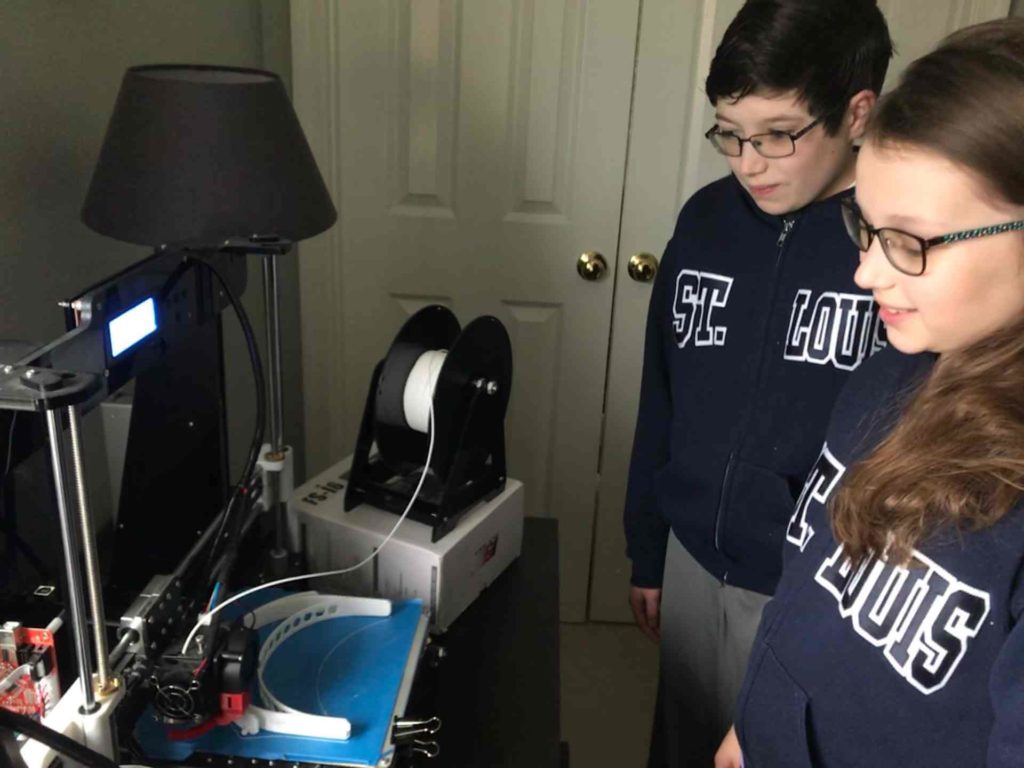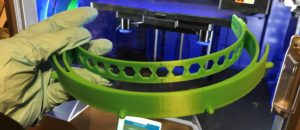
GLEN BURNIE – Catholic schools in the Archdiocese of Baltimore are stepping up to aid health care workers by helping to produce face shields desperately needed during the coronavirus pandemic.
As of March 30, approximately 25 faculty and students from eight Catholic schools were using the schools’ 3D printers to assist in the production of face shields, in cooperation with Open Works, Innovation Works and We the Builders, makerspaces in Baltimore City.
The “Makers Unite! Face Shield Project” is drawing on maker community members with 3D printers to help produce parts for plexiglass face shields, which are assembled by teams at Open Works. The face shields will be used in Baltimore and surrounding hospitals.
Joe Oleszczuk, director of educational technology for the archdiocese’s Department of Catholic Schools, said the first week of the program was a “pilot” period as school administrators, teachers and students pulled together to get printers running and to find additional filament to produce the parts.
He said technology teachers took the lead in contacting his office. Because campuses are closed, teachers, working with school administrators, have brought printers home. He is also working with three students, using their families’ 3D printers for his project. School administrators are donating filament and helping to coordinate the locations of their schools’ printers. Other individuals are volunteering to gather materials and drop off the finished parts to Open Works.
In the coming week, Oleszcsuk said he hopes to expand the 3D printer teams and is looking for more families with printers that meet the requirements to make parts. Anyone interested in participating can begin by visiting https://forms.gle/4rzmqRvLfMSGCZY78 .
“We’ve learned a lot in how to mobilize this kind of print,” Oleszcsuk said. “There are multiple 3D printing initiatives right now. This is the one we adopted since it’s well-supported in this area.”
Oleszczuk said he has multiple printers operating in his home, including the 3D printers from Monsignor Slade Catholic School in Glen Burnie. They were brought home by his wife, Kathleen Oleszczuk, Slade’s STEM coordinator. Their production crew includes their three children, all students at Catholic schools in the archdiocese.
“She volunteered to come in and take the printers to her house,” said Alexa L. Cox, the Slade principal. “She’s running all three simultaneously to print these masks.”

Cox said when she learned of the face shield project and how Slade could take part, she said “yes” right away. She said Slade is donating its printing filament and encouraging other Catholic schools to do the same. The printing material is in short supply, she added, since it is made in China, where the manufacturing process has been disrupted. Most schools and individual families have ordered the material through Amazon, which is currently delaying non-essential orders.
As part of its curriculum, Slade students learn how to design objects to be made on the 3D printers, Cox said. She pointed out the value of having her students know that their printers are now being used to protect health care workers during the crisis.
“It teaches them it’s part of our Catholic identity to reach out in times like this for the greater good of the community,” she said. “This is a perfect way to help out.”
Zulma Whiteford is the technology teacher and STEM coordinator at St. Louis School in Clarksville. She said her school was among the first to be involved in the project, and noted that technology teachers in the archdiocese encourage their students to use these tools and the Catholic values they are taught to be problem-solvers in the world.
“Here we are now in a real-world problem,” Whiteford said. “The community has really stepped up. It’s incredible. We did a call out to all our families. I have four or five families that are saying, ‘Oh, I’m in.’ But the need is still so great.”
Whiteford said she hopes her St. Louis team, coordinating with Oleszczuk, will be producing the parts for 15 face shields a day.
“It’s exciting to be able to be part of this,” Whiteford said. “If we can do something and make a little difference in the world, if we can help a handful of people, then that’s a handful of people that are better off because of us.”
At Monsignor Slade School, Cox said using the 3D printers for the face shields is a great project that demonstrates the “Slade spirit” of helping others in their times of need.
“It’s unfortunate that we’re in these times,” she said. “But it’s great for our kids to see what they’re learning in school has a value and can help the community.”
According to Oleszcuk, his household and St. Louis School have already delivered parts for 18 and 30 masks, respectively.
He said that teaching students to be makers, people who create and craft, helps them to see the world in different ways. Being able to create gives them the tools to make a change in their lives and their communities, he said.
“When they talk about makers, this is what makers are good at: they’re good at solving problems,” Oleszczuk said. “It’s all of the makers in this community, they see this challenge and think ‘we know how to make a difference here.’”
For more on the archdiocesan response to the coronavirus pandamic, click here.

